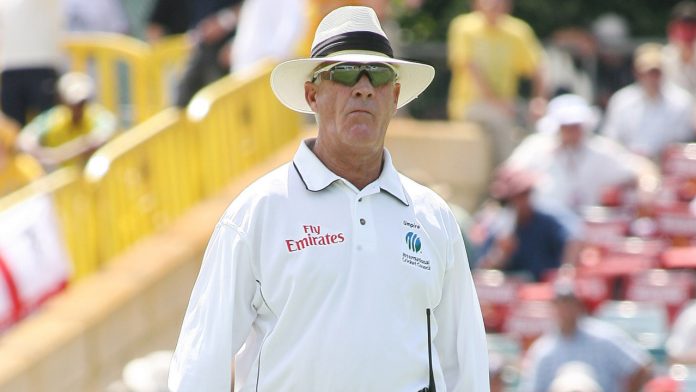In an international career spanning 18 years, he officiated in 331 matches, the second-most for an umpire.
Rudi Koertzen, the former South African umpire who was part of the ICC’s elite panel, has died aged 73. He died in a car accident while driving from Cape Town to Despatch in Eastern Cape in South Africa, where he lived with his family.
Koertzen’s son, Rudi Koertzen jr, confirmed the news. “He went on a golf tournament with some of his friends, and they were expected to come back on Monday, but it seems they decided to play another round of golf,” Koertzen Jr told Algoa FM News, a South African website.
Koertzen was part of the ICC’s elite panel of umpires for eight years from 2002 and officiated in 331 international matches, a record at the time of his retirement in 2010, which has since been broken by Pakistan’s Aleem Dar. Along with Dar and West Indies’ Steve Bucknor, Koertzen was one of three umpires to stand in over 100 Tests.
“It is a very big loss foremost for his family and then for South Africa and cricket,” Dar said of Koertzen’s death. “I stood in so many games with him. He was not only very good as an umpire but also an excellent colleague, always very cooperative on field and also always willing to help off the field. Because of the way he was, he was also well-respected by players.”
Fellow South African umpire Marais Erasmus said: “Rudi was such a strong character, physically and mentally. He paved the way for South African umpires to get to the world stage. Made us all believe it’s possible. A true legend. As a young umpire, I learnt a lot from him.”
At the age of 43, Koertzen’s first international series was India’s tour of South Africa in 1992-93; his first game was the second ODI in Gqeberha (then Port Elizabeth). He went on to become one of the best and most well-respected umpires in the world, and won praise in September 1999 for refusing a bribe to manipulate a match between West Indies and India in Singapore. The 2007 World Cup final, however, was a blip in his career: Koertzen was the third umpire in that match in Barbados, where the officials came in for criticism – and were penalised by the ICC – following a chaotic finish to the game.
After retiring as an international umpire in 2010, Koertzen published a book, Slow Death: Memoirs of a Cricket Umpire (with Chris Schoeman), in which he addressed the 2007 World Cup final. Koertzen went by the nickname “Slow Death” because of the amount of time he took to raise his finger while giving a batter out.
The last representative game Koertzen stood in was in 2011, an IPL match between Royal Challenger Bangalore and Chennai Super Kings in Bengaluru.
At the time of his death, he was still umpiring a few games in his hometown of Despatch and helping his local club, Despatch Cricket Club, with preparing pitches.
“A legend in his own right passed away this morning and will definitely leave a great void in the cricket world,” Despatch Cricket Club said in tribute today. “We want to express our heartfelt sympathy and empathy to Uncle Rudi Koertzen’s family and loved ones.”
Cricket South Africa chairperson Lawson Naidoo said: “Rudi departs at the time when cricket is beginning to enjoy the fruit of his toil. His passing has robbed us of a giant upon [whose] foundation we now stand.
“While this is a sad day for cricket in South Africa, we are however comforted by the many lessons of servitude and servant leadership he has left behind for us to embody and emulate.”
In his youth, Koertzen played top-division club cricket in Kimberley and was a medium pacer. Before becoming a professional umpire, as he told in an interview in August 2010, he “worked for the railways as a carpenter in Port Elizabeth. Then I worked as a superintendent in the building trade, in the civil engineering section, supervising new buildings and renovations. I worked for them for 28 years and was a semi-professional umpire until … 1993.”
Source By – ESPN














